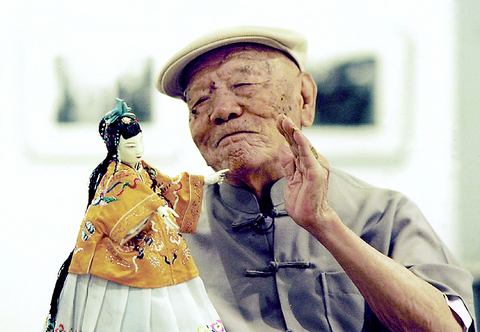Legendary Taiwanese puppet master Huang Hai-tai (
Relatives said Huang died at his home in Yunlin County weeks after coming down with pneumonia.
Hand puppetry was introduced to Taiwan by immigrants from China in the 19th century. Most puppet shows recount historical stories or feature Chinese swordsmanship.

PHOTO: CHEN CHIEN-CHUNG, AFP
The creativeness and innovation of Huang, his sons and grandchildren has contributed to the continuous prosperity of the art.
In the 1990s, Huang's grandchildren founded Pili International Multimedia Corporation (霹靂國際多媒體集團, PIMC), a multimillion-dollar firm that produces hand puppetry movies and TV series.
As a boy, Huang learned hand puppetry from his father, who was leader of a local puppet troupe.
PIMC's Web site said that in addition to performance skills, Huang had a vast knowledge of Chinese classical literature and used his ability to play several different musical instruments to embellish his performances.
Huang would also choreograph, sing and narrate during shows and established his own puppet troupe at the age of 25.
He skirted a ban on traditional Taiwanese art performances by giving puppet shows in Japanese.
"Although he never learned Japanese, he memorized lines in Japanese so that the Japanese couldn't ban his performances," Huang Chun-hsiung (
Huang was forced to move his performances indoors after the post-World War II Chinese Nationalist Party (KMT) government temporarily banned traditional outdoor performances after the 228 Incident.
In the 1950s, Huang Chun-hsiung used TV to increase the popularity of puppetry.
"When I was in high school the only thing we cared about after school was Huang's puppet shows on TV," said Chien Ling-yuan (簡玲媛), a woman now in her fifties. "We'd skip class for that."
However, in the 1970s, Huang Chun-hsiung's puppet shows were banned from TV because they were produced with Taiwanese dialogue. This conflicted with the KMT's policy calling for the use of Mandarin.
Huang's two sons later took over their aging father's puppetry troupe. In recent years, Huang's grandchildren have further augmented the show by adding such innovations as orchestra music and special effects.

Tropical Storm Gaemi strengthened into a typhoon at 2pm yesterday, and could make landfall in Yilan County tomorrow, the Central Weather Administration (CWA) said yesterday. The agency was scheduled to issue a sea warning at 11:30pm yesterday, and could issue a land warning later today. Gaemi was moving north-northwest at 4kph, carrying maximum sustained winds near its center of up to 118.8kph and gusts of 154.8kph. The circumference is forecast to reach eastern Taiwan tomorrow morning, with the center making landfall in Yilan County later that night before departing from the north coast, CWA weather forecaster Kuan Shin-ping (官欣平) said yesterday. Uncertainty remains and

SEA WARNING LIKELY: The storm, named Gaemi, could become a moderate typhoon on Wednesday or Thursday, with the Taipei City Government preparing for flooding A tropical depression east of the Philippines developed into a tropical storm named Gaemi at 2pm yesterday, and was moving toward eastern Taiwan, the Central Weather Administration (CWA) said. Gaemi could begin to affect Taiwan proper on Tuesday, lasting until Friday, and could develop into a moderate typhoon on Wednesday or Thursday, it said. A sea warning for Gaemi could be issued as early as Tuesday morning, it added. Gaemi, the third tropical storm in the Pacific Ocean this typhoon season, is projected to begin moving northwest today, and be closest to Taiwan on Wednesday or Thursday, the agency said. Today, there would likely

DISRUPTIONS: The high-speed rail is to operate as normal, while several airlines either canceled flights or announced early departures or late arrivals Schools and offices in 15 cities and counties are to be closed today due to Typhoon Gaemi, local governments announced last night. The 15 are: Taipei, New Taipei City, Taoyuan, Tainan, Keelung, Hsinchu and Kaohsiung, as well as Yilan, Hualien, Hsinchu, Miaoli, Chiayi, Pingtung, Penghu and Lienchiang counties. People should brace for torrential rainfall brought by the storm, with its center forecast to make landfall on the east coast between tonight and tomorrow morning, the Central Weather Administration (CWA) said. The agency issued a sea warning for the typhoon at 11:30pm on Monday, followed by a land warning at 11:30am yesterday. As of

CASUALTY: A 70-year-old woman was killed by a falling tree in Kaohsiung as the premier warned all government agencies to remain on high alert for the next 24 hours Schools and offices nationwide are to be closed for a second day today as Typhoon Gaemi crosses over the nation, bringing torrential rain and whipping winds. Gaemi was forecast to make landfall late last night. From Tuesday night, its outer band brought substantial rainfall and strong winds to the nation. As of 6:15pm last night, the typhoon’s center was 20km southeast of Hualien County, Central Weather Administration (CWA) data showed. It was moving at 19kph and had a radius of 250km. As of 3pm yesterday, one woman had died, while 58 people were injured, the Central Emergency Operation Center said. The 70-year-old